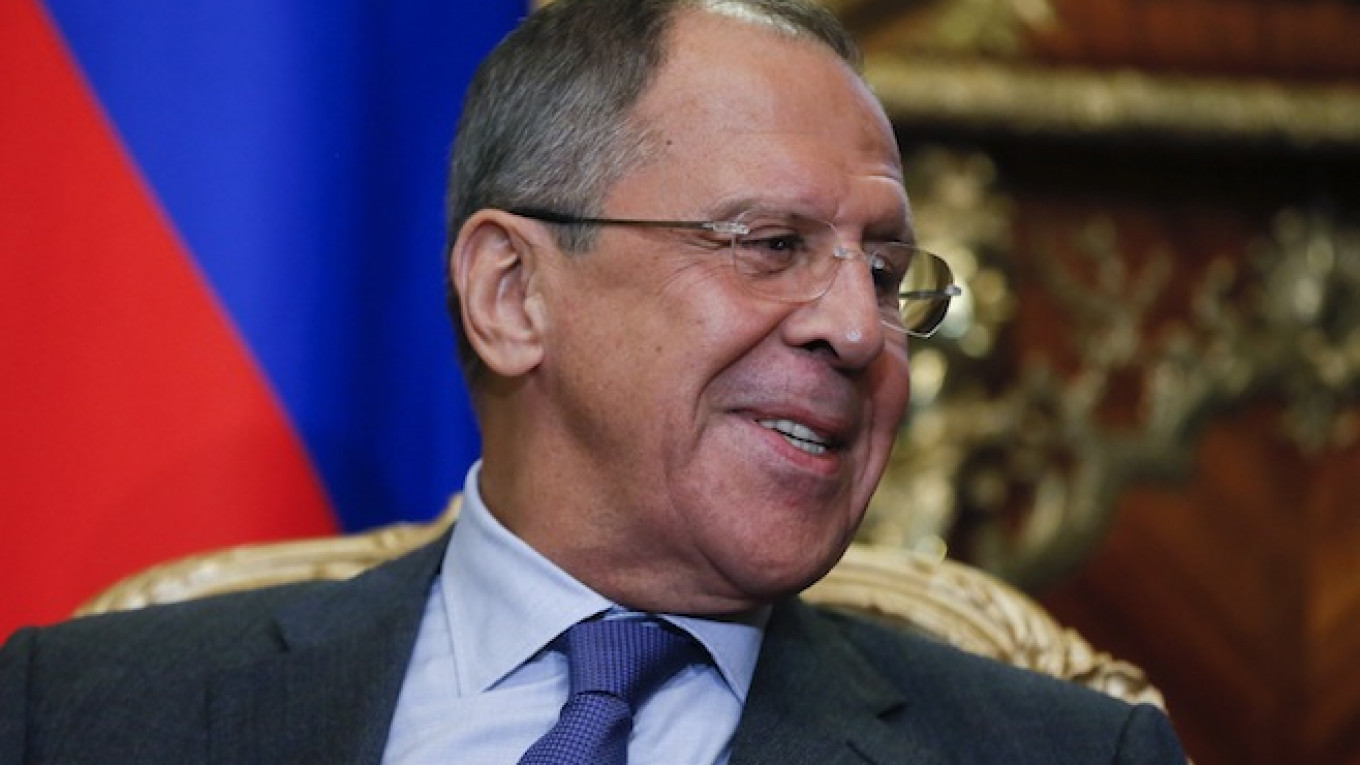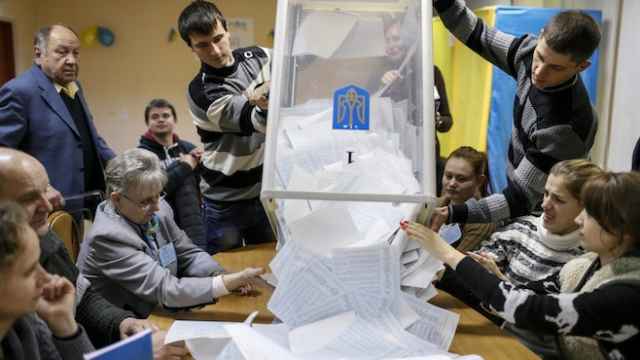Russia will recognize the results of the upcoming separatist elections in eastern Ukraine, Foreign Minister Sergei Lavrov said, having extended the same acknowledgment to Ukraine's national parliamentary balloting that returned a Western-leaning legislature.
Separatists in the Donetsk and Luhansk regions plan to hold votes for heads of their self-proclaimed states and for legislatures this Sunday, after boycotting Ukraine's parliamentary election a week earlier.
"We expect the elections to take place as agreed, and we will, of course, recognize their results," Lavrov said in an interview with the Izvestia daily and LifeNews news site published Tuesday.
"We count on it that the vote shall be free and nobody from the outside will attempt to disrupt it," he was quoted as saying.
A peace agreement reached in Minsk, Belarus last month by representatives of Russia, Ukraine and the two separatist regions, allows for "local elections" in Donetsk and Luhansk to form "temporary" self-governance bodies under a new law on "special status" for the territories. But the separatists remain defiant in insisting on full independence from Ukraine.
The law on special status, envisaged by the Minsk agreement, "does not concern us because it was signed by the president of another country," Donetsk separatist premier Alexander Zakharchenko, one of the signatories of the Minsk deal, was quoted as saying this month by the TASS news agency.
"We are determined for independence. We believe that our territory had been illegally occupied," he was quoted as saying.
The issue could prove thorny for Moscow, and Lavrov avoided mentioning calls for secession in his interview, instead saying that the upcoming balloting in eastern Ukraine would enact "one of the most important directives of the Minsk agreements."
Denouncing the separatists hardly seems to be an option for Moscow, after months of rallying public support for its policies in Ukraine on the claim of protecting the neighboring country's Russian speakers from persecution and "genocide."
But maintaining the claim that Ukraine's government and public mood are dominated by neo-fascists is also growing increasingly difficult, after ultra-nationalist parties fared dismally in both May's presidential election — which put moderate Petro Poroshenko at Ukraine's helm — and in the parliamentary balloting last Sunday.
While ultra-nationalist Right Sector leader Dmytro Yarosh appears set to take a single-mandate constituency based on preliminary results, his party has failed to clear the 5 percent barrier to enter parliament. Fellow far-right Svoboda and the Radical Party look likely to scrape places in the legislature, the UNIAN news agency reported, citing data from the Central Elections Commission.
The cheering in Russia for Moscow's annexation of Crimea and its policies against "fascists" in Ukraine has sent President Vladimir Putin's approval ratings soaring above 80 percent. But support has recently started to recede, according to a recent survey by the independent pollster Levada Center, as the conflict in Ukraine has dragged on and the Russian ruble has been losing value amid Western sanctions.
If Russia were to hold a new presidential election, the number of eligible voters who would cast ballots for Putin dropped to 49 percent in September from a peak of 57 percent in August; among decided voters the number dropped from 87 percent to 83 percent over the same period, according to the poll cited by RBK on Tuesday. Levada Center polls usually have a margin of error or 3.4 percentage points.
In a departure from Moscow's past ominous predictions, Lavrov acknowledged that Ukraine's ultra-nationalist parties do not have the public support base that the Russian government had once claimed they enjoyed.
Even for those that scraped into parliament, "I would not call this a victory," he said, according to the interview with Izvestia and LifeNews. "I would call it, as the saying goes, clearing the threshold."
But he added that any number of seats scored by ultra-nationalist candidates in the legislature still "causes rather serious concerns."
Government claims about the supposed rise of nationalists in Ukraine have been fiercely upheld by state-run television, which for months has inundated viewers with gruesome reports — some of which have been found to contain falsifications — about the supposed crimes by Ukraine's government forces.
The pitch continued in the run-up to the the parliamentary elections.
Introducing a report Saturday about hackers who who took over electronic billboards in the center of the Ukrainian capital on the eve of the election, an anchor at Channel One television said: "The horrifying images of what is happening in the Donbass — which Ukrainian television doesn't show — were still seen by inhabitants of Kiev."
At least one of the images shown in Kiev and in the Channel One newscast, however, comes from AFP photo archives, which identify it as having been taken by an AFP photographer in Chechnya in 1995.
A Message from The Moscow Times:
Dear readers,
We are facing unprecedented challenges. Russia's Prosecutor General's Office has designated The Moscow Times as an "undesirable" organization, criminalizing our work and putting our staff at risk of prosecution. This follows our earlier unjust labeling as a "foreign agent."
These actions are direct attempts to silence independent journalism in Russia. The authorities claim our work "discredits the decisions of the Russian leadership." We see things differently: we strive to provide accurate, unbiased reporting on Russia.
We, the journalists of The Moscow Times, refuse to be silenced. But to continue our work, we need your help.
Your support, no matter how small, makes a world of difference. If you can, please support us monthly starting from just $2. It's quick to set up, and every contribution makes a significant impact.
By supporting The Moscow Times, you're defending open, independent journalism in the face of repression. Thank you for standing with us.
Remind me later.






